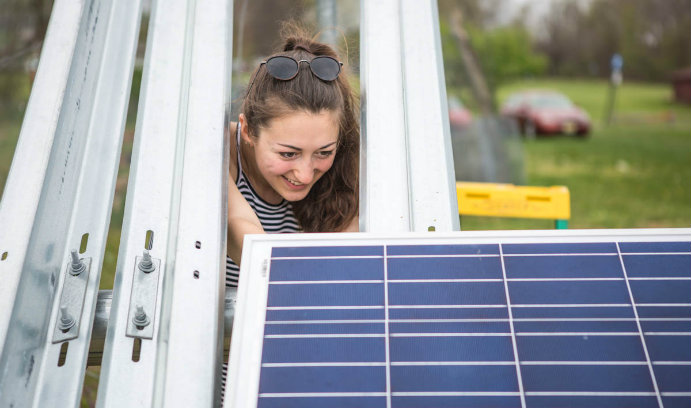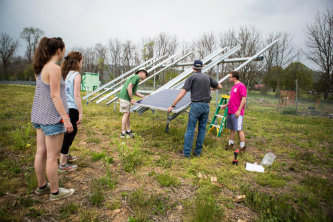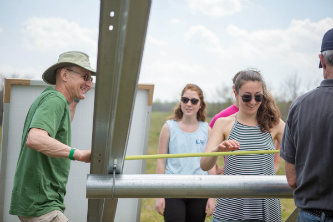A Push Toward Sustainability

Solar panels installed near the Community Garden on the Goodman Campus are a source of alternate energy at Lehigh. The project was part of Lehigh’s Mountaintop initiative.
As part of Lehigh’s energy-conscious efforts, six students led an initiative earlier this year to install solar panels next to the Community Garden on the Goodman Campus.
The project was part of Lehigh’s Mountaintop initiative and was pioneered by Bill Best, professor of practice in electrical and computer engineering, and Breena Holland, associate professor of political science and a participating faculty member in Lehigh’s Environmental Initiative. Both served as advisors to the students.
The Mountaintop project was based around the idea of sustainable farming at the gardens—to create an energy-independent food-growing farm. As a result, 16 solar panels now sit on Goodman Campus, 12 of which were purchased several years ago with money from an IPD (Integrated Product Development) program grant.
The panels, which were completed and installed in May, are a source of alternative energy to power the water pump at the gardens and to offset the energy used by the nearby transportation building.
“Because the energy generated by the panels is more than needed at the community garden, we decided to connect the electrical supply to the transportation building,” Holland said.
The 16 panels produce a maximum of 255 watts each, creating a maximum ceiling of just over 4,000 watts of energy. While this is not only an ample amount of energy for the current demand at the community garden, it serves as a much cleaner and viable option, Holland said.
“The panels are used to provide electricity to power the water pump, which pumps water out of the well and into the gardens,” Holland said. “Having these panels means we use their energy from the sun instead of needing to use a diesel generator.”
Because a lot of planning and strategy went into gathering the resources necessary to install the panels, they were not installed until almost a year after the summer Mountaintop project had concluded.
“A lot of what we did was putting together proposals for the panel installation, because we needed more funding,” said Michael Miller ’17, who worked directly on the plans for the solar panels and the sustainable farming project.
In time, the project was able to get the funding it needed, as well as the donation of time and resources from several different companies.
Terrasmart, a large Florida-based solar energy company, gave the team the four additional ground screws for a second rack and installed them when they came to set up the first rack. The cost of installation was the major expense, and the project was funded by Sodexo & Lehigh Dining Services, Student Auxiliary and the Mountaintop initiative. Diefenderfer Electrical also donated their time to set up the electrical wiring among the panels, the transportation building and the water pump.
The panels are part of a larger push toward a more sustainable university.
“The Office of Sustainability is constantly looking for sources of alternative energy,” said Katharine Targett, sustainability program manager at Lehigh.
After the success of the Mountaintop project’s proposal for the first set of panels, Holland hopes that 16 more panels will be installed in the coming months, next to the first installation.
Story by Henry Greenberg
Photos by Christa Neu
Posted on:






